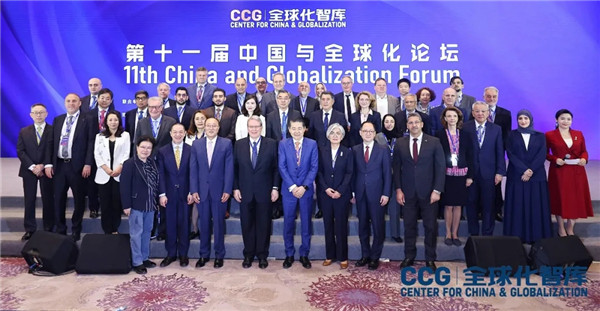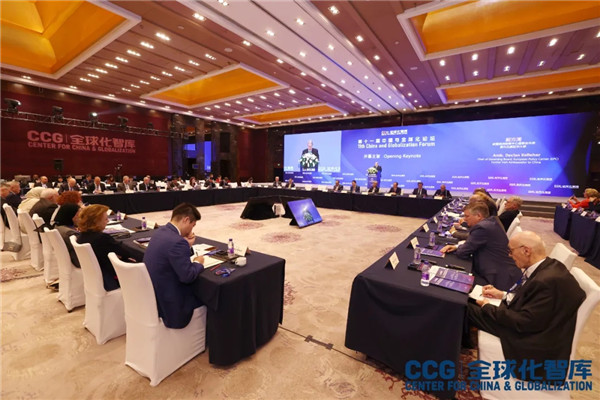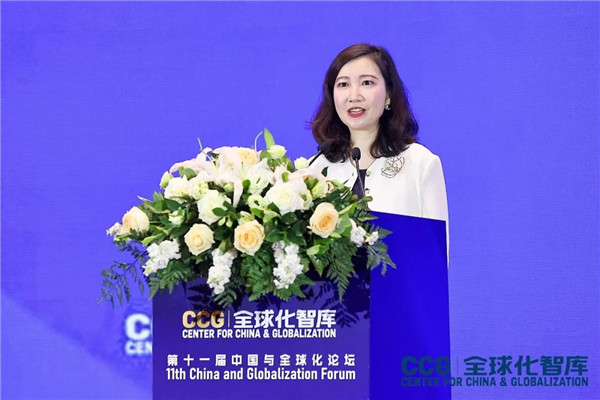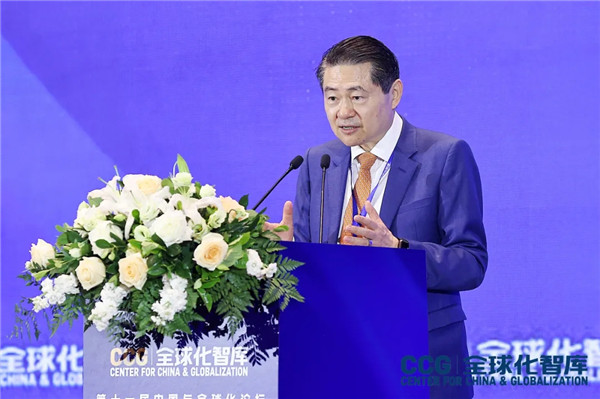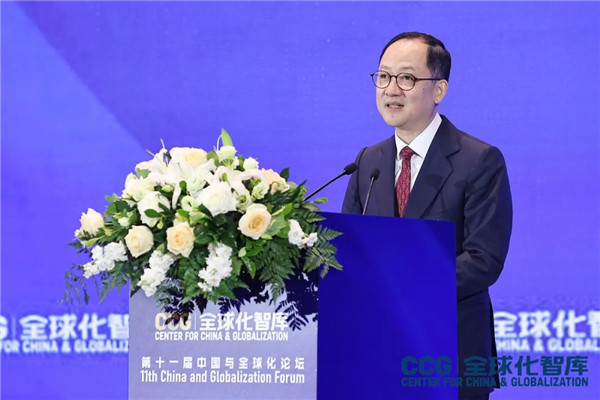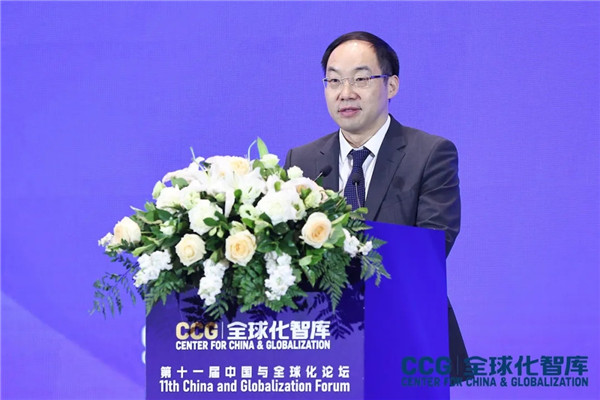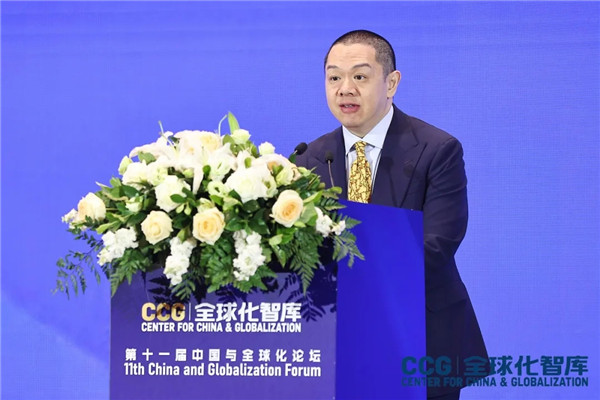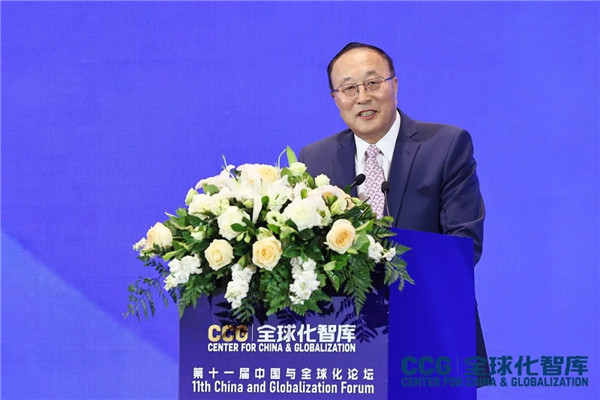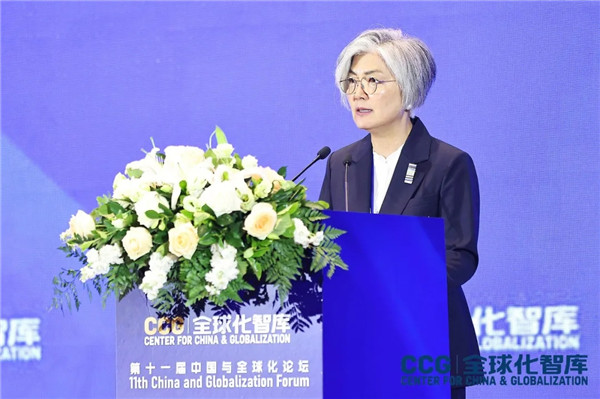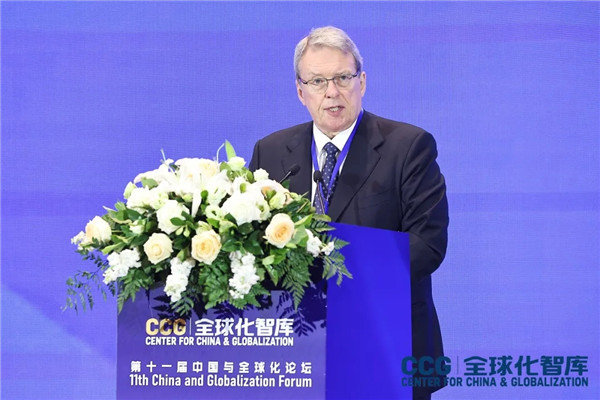Opening Session of the 11th Annual China and Globalization Forum
The 11th Annual China and Globalization Forum, jointly convened by the Center for China and Globalization (CCG) and the Chinese People’s Association for Friendship with Foreign Countries (CPAFFC), and co-organised by the Academy of Contemporary China and World Studies (ACCWS) and the China-United States Exchange Foundation (CUSEF), concluded successfully in Beijing after a three-day agenda from May 22 to 24.
Openning Session @ CCG 11th China and Globalization Forum
Below is the transcript of the forum’s opening session, moderated by Mabel Lu Miao, CCG Secretary General. The session features welcome remarks from:
Henry Huiyao Wang, Founder and President, CCG
SHEN Xin, Vice President, Chinese People’s Association for Friendship with Foreign Countries (CPAFFC)
YU Yunquan, Vice President, China International Communications Group (CICG); President, Academy of Contemporary China and World Studies (ACCWS)
James Chau, President, China-United States Exchange Foundation (CUSEF); Goodwill Ambassador, World Health Organization
and opening keynotes from:
ZHANG Jun, Secretary General, Boao Forum for Asia; Former Chinese Ambassador to the UN
Kyung-wha Kang, President and Chief Executive Officer, The Asia Society; Former Minister of Foreign Affairs of South Korea
Declan Kelleher, Chair of Governing Board, European Policy Centre (EPC); Former Irish Ambassador to China
Opening Session
Mabel Lu MIAO, Co-founder and Secretary General, Center for China and Globalization (CCG)
Your Excellencies, distinguished guests, colleagues, and friends, good morning,
It is my great pleasure to welcome you all to the 11th China and Globalization Forum. This year, we are privileged to co-host the forum once again with the Chinese People’s Association for Friendship with Foreign Countries (CPAFCC).
Our heartfelt thanks also go to our co-organisers: the Academy of Contemporary China and World Studies (ACCWS) and the China-United States Exchange Foundation (CUSEF), and to our partners, including the Konrad Adenauer Foundation, the Amersi Foundation, the Centre on Regulation in Europe (CERRE), the Doha Forum, and the Asia Society. Their steadfast support and collaboration have been crucial to making this forum a meaningful space for dialogue.
We are honoured to welcome policymakers and diplomats to this forum, along with experts from think tanks across Asia, Europe, America, and Africa; professionals from various international organisations, NGOs, and foundations; scholars from over 20 universities worldwide; executives from more than 30 multinational companies; representatives from several international and domestic outlets; and officials from relevant Chinese government departments.
Without further ado, please join me in welcoming Dr. Wang Huiyao, Founder and President of the Center for China and Globalization (CCG) and former Counsellor to China’s State Council, to deliver his welcome remarks. Dr. Wang, please.
Henry Huiyao WANG, Founder and President, Center for China and Globalization (CCG)
Ambassador Secretary Zhang Jun, President Shen, President Yu, President Chau, Her Excellency Minister Kyung-wha Kang, Ambassador Declan Kelleher, distinguished guests, colleagues, friends, ladies and gentlemen,
It’s really extremely honoured to welcome all to this 11th China and Globalization Forum, right here in the heart of the Beijing CBD district. This forum is jointly convened by the Center for China and Globalization and the Chinese People’s Association for Friendship with Foreign Countries (CPAFCC), and co-organised by the Academy of Contemporary China and World Studies (ACCWS) and the China-United States Exchange Foundation (CUSEF). So, thank you all for supporting this conference.
Over the past 10 years, this forum has brought together leaders, policymakers, experts, and practitioners from around the world to discuss the major trends shaping globalisation, global governance, and China’s roles in the world. For the last 10 years, there’s been no stop, not even during the COVID—we hold this annual forum every year. So this is the 11th time we’re holding this today.
As we convene the 11th edition of this forum, the international environment is marked by unprecedented complexity and challenges. For instance, the China-U.S. relationship remains at a critical juncture. The recent escalation of trade tensions continues to disrupt the global trade supply chains and increase economic uncertainty for the whole world. While we’ve seen some major progress at the Geneva trade talks, we hope it will continue.
Beyond trade, conflicts in Ukraine and the Middle East continue to impose huge humanitarian crises and tragedies, which are witnessed by the whole world. At the same time, global governance structures face serious pressure. Multilateralism is being tested by unilateral actions, geopolitical rivalry, and fragmented international cooperation. Issues such as climate change, global health, global debt, and economic recovery require urgent collective action, and particularly global peace. Yet, consensus is often lacking.
Meanwhile, the Global South’s role is expanding. Countries in Asia, Africa, Latin America, and the Middle East now account for a growing share of the global population, economic growth, and international impact. Their voices are increasingly critical in discussions about reforming global multilateralism to become more inclusive and equitable.
Against this backdrop, we are honoured to be joined by more than 300 distinguished guests gathered from more than 60 countries, including policymakers, diplomats, representatives of international organisations, renowned think tank experts, academics, corporate executives, and representatives from leading Chinese and international media outlets.
Over the next two days, we will have a very fruitful programme. We’ll explore a broad range of pressing issues, including: the renewal of global governance and multilateralism in uncertain times like today, navigating the evolving China-U.S. relations and the improving of China-EU relations, China’s increasing engagement with the Global South and Middle East, and global governance in high-tech, AI, and other regulatory areas.
As the organiser and also a dedicated convenor of global dialogue, the Center for China and Globalization ranks as one of the top 100 think tanks in the world and is the only non-governmental think tank in China that has the Special Consultative Status of the United Nations. We are committed to building bridges across nations and cultures, fostering mutual understanding, and contributing China’s wisdom and experience to the world.
Let’s cherish that the founding of the United Nations 80 years ago marked a solemn commitment to peace, cooperation, and multilateralism—values that remain vital today as ever. It is our shared responsibility to uphold and renew this commitment in the face of unprecedented, complex challenges.
Once again, I want to express my sincere thanks to all of you participating. We have wonderful participants from around the world, and also from China. I look forward to your insights, your contributions to the rich discussions, and I would really encourage you to listen carefully to the keynote address that we’re going to have this morning, which will help strengthen the capability of humanity in meeting those challenging times.
Thank you all very much. I appreciate it.
SHEN Xin, Vice President, Chinese People’s Association for Friendship with Foreign Countries (CPAFFC)
Actually, I don’t expect that participants from other countries are more than the participants from China, but I have only the speech in Chinese in my hand. So I have to ask you to put on your earphones and listen to the interpretation.
[Speaking in Chinese]
It is a great pleasure to attend the 11th China and Globalization Forum. On behalf of the Chinese People’s Association for Friendship with Foreign Countries (CPAFCC), I would like to extend my warm welcome and sincere greetings to all the distinguished participants.
Talking about globalisation, I recall a book that captured global attention two decades ago—The World is Flat by Thomas Friedman. In this book, Mr. Friedman vividly described a phenomenon he observed during his global travels: globalisation was flattening the world. He went on to analyse ten key forces that contributed to this flattening, including the end of the Cold War and the rise of the Internet. At the time, I read the book in one sitting, filled with hope and imagination for a “flat” world.
Now, twenty years later, I took the time to revisit the book and found that its vision of the future, while forward-looking at the time, may not have been bold enough. Over the past two decades, disruptive technologies have emerged one after another, technological iterations have dazzled the world, and globalisation has advanced at a pace beyond our imagination, profoundly influencing and reshaping the course of human development. The world has become even flatter than Mr. Friedman envisioned.
However, what Mr. Friedman may not have foreseen is this: the very countries that initiated, propelled, and set the rules of globalisation—developed nations represented by the United States—are now experiencing a backlash against globalisation. They are even rushing to introduce various de-globalisation measures.
What has happened to globalisation? Is a flat world a better world? Today, I would like to take this opportunity to share a few modest reflections on these questions, in the hope of contributing some food for thought to this forum.
Looking back, the positive impact of globalisation over the past 20 years is undeniable. Economic globalisation has generated 150 million jobs in developing countries. Between 1990 and 2019, the number of people living in extreme poverty worldwide fell from 1.9 billion to 650 million—a 60% decline in the global poverty rate over three decades. During the same period, global merchandise trade soared from $350 billion to $25.3 trillion. This surge in international trade has driven down the cost of goods, enhancing the quality of life for ordinary people. In the United States, for example, consumer prices have fallen by 15% to 30% overall.
Globalisation has also promoted a more equitable distribution and flow of medical resources across countries. The global average life expectancy rose from 64 years in 1990 to 73 years in 2019. In Africa, the child vaccination rate increased from 20% in 1980 to 75% in 2020.
The benefits globalisation has brought to people around the world are too numerous to count. Yet today, especially in developed countries—the very ones that crafted the rules of globalisation and guided its course—waves of anti-globalisation and de-globalisation are gaining momentum. Why has this happened?
Nobel Laureate in Economics Joseph Stiglitz offers an explanation in his book Globalization and Its Discontent: in every country, globalisation produces both winners and losers. If the winners were willing to share part of their gains with the losers, globalisation could yield benefits for all. Unfortunately, as a group, the winners have often acted out of self-interest. During the era of rapid globalisation, political power tended to concentrate in their hands. This has been especially true in the United States, where money plays a huge role in shaping political outcomes.
Globalisation itself is not the problem—the real issue lies in how it is managed. U.S. Senator Bernie Sanders has repeatedly highlighted that the three richest individuals in the United States hold as much wealth as the bottom 170 million of the country. The top 1% of elites sit atop a pyramid that controls 90% of the nation’s wealth. The average CEO of a U.S. multinational corporation earns 300 times the salary of an ordinary worker. While a small segment of the population enjoys immense wealth, more than 85 million Americans are either uninsured or underinsured, and over 800,000 are homeless. Adjusted for inflation, the real wages of average American workers have remained flat for the past half-century.
In response to the challenges posed by globalisation, many have begun to yearn for the “good old days,” with some even expressing a desire to return to them. Certain politicians have exploited this sentiment, fuelling populist and nationalist ideologies. They attempt to recast domestic problems as consequences of globalisation. Yet this approach—prescribing external remedies for internal ailments—can not resolve a country’s development bottlenecks. On the contrary, it infringes upon the legitimate rights and interests of other nations, disrupts the multilateral trading system, threatens the global economic order and international cooperation, and creates widespread uncertainty and instability. In the end, such backlash is bound to rebound on those who provoke it.
In response to the challenges of globalisation, we must seize every opportunity and ensure a fairer, more equitable distribution of its benefits by harnessing the power of inclusiveness and cooperation, thereby broadening public support of globalisation and ushering in a new phase marked by greater vitality, inclusiveness, and sustainability.
Chinese Leader has, on many occasions, pointed out profoundly that humanity is a community with a shared future where all people rise and fall together. We should view each other’s development not as a threat but as an opportunity, treat each other as partners rather than rivals, and make global solidarity, cooperation, and mutual benefit the defining themes of our time.
In a rapidly changing global landscape, China is making the right choice in history through concrete actions, contributing stability and certainty to the world.
Between self-isolation and reform and opening up, China has resolutely opted for the latter. No country today can achieve development behind closed doors. Continuously advancing reform and opening-up to higher standards is a key source of vitality for China’s development. Openness is a defining feature of China’s path to modernisation. Strengthening exchanges and cooperation with countries around the world to address global challenges serves the common interests of all nations and helps foster a peaceful and stable international environment.
Between unilateralism and multilateralism, China actively upholds and practices multilateralism. A multipolar world is both a historical inevitability and an emerging reality. Jointly defending and practising true multilateralism is a core principle underpinning China’s development philosophy. Advancing the creation of a more equal and orderly multipolar world is an important proposal put forward by Chinese Leader, and reflects our sincere hope for such a future. China will be a stabilising force in the multipolar system and a constructive contributor to a world in transformation.
Between social polarisation and common prosperity, China strives to realise common prosperity. Over 3,000 years ago, Chinese thinkers proposed that the foundation of good governance lies in enriching the people. Chinese Leader has repeatedly emphasised that achieving common prosperity is a fundamental objective of socialist modernisation. We must always take the people’s new expectations for a better life as both the starting point and the ultimate goal of development. In the process of modernisation, we should strive to gradually narrow regional, urban–rural, and income disparities, and ensure and improve the people’s well-being in the course of pursuing development. We should also ensure that the benefits of development are shared more fully and more fairly by all by promoting social equity and justice.
Between clinging to outdated models and upholding fundamental principles while breaking new ground, China has chosen the latter. Strengthening scientific and technological innovation is key to unlocking China’s future development. The Chinese government is committed to providing young people with a broad stage for innovation, abundant resources, and an inclusive environment that tolerates trial and error. Young people are encouraged to break conventions and explore the unknown. A recent example was the humanoid robot half-marathon in Beijing. Though the robots were far from matching human speed and only a few managed to finish the race, many years from now, we may look back at this imperfect event and recognise it as a bold starting point for a technological revolution in robotics.
Economic globalisation is the result of the deepening development of production forces, technological empowerment, market dynamics, and international division of labour. It is a historical trend that cannot be reversed by human will. Though we recognise that the road ahead will be challenging, countries around the world should choose to shake hands, not raise fists; to dismantle walls, not build them; and to connect, not decouple. In the face of difficulties and challenges, the right course is not to turn back, but to join hands in shaping a better future. As long as we stand on the right side of history—on the side of human progress and civilisation—we can promote high-quality development through openness, deepen international cooperation through dialogue, and ultimately find a path to mutual benefit and win-win outcomes. In doing so, we can make the pie of globalisation not only larger, but also more equitably shared.
Finally, I wish the forum a great success. Thank you all.
YU Yunquan, Vice President, China International Communications Group; President, Academy of Contemporary China and World Studies (ACCWS)
[Speaking in Chinese]
Thank you, Dr. Miao, for your kind introduction. Dear President Wang Huiyao, Vice President Shen Xin, Secretary General Zhang Jun, Esteemed President Kyung-wha Kang, Chairman Kelleher, ladies and Gentlemen, good morning.
It is a great pleasure to be invited to attend this year’s forum. As a co-organiser, we would also like to extend our warmest greetings to over 300 distinguished guests from more than 60 countries and express our heartfelt congratulations on the successful convening of the forum.
At present, profound changes unseen in a century are unfolding at an accelerating pace. Hegemonism, unilateralism, and protectionism are on the rise. The global economic recovery remains fragile and is decelerating, while regional peace and development face growing instability and uncertainty. Earlier this month, the United Nations Development Programme released its Human Development Report 2025, noting that the stagnation of human development has become the most widespread in 35 years. At the start of this year, the World Economic Forum published its Global Risks Report 2025, warning that as technological transformation accelerates, persistent structural forces – such as shifting geopolitical dynamics, climate change and demographic divergence – are giving rise to a fragmented world. Global risks are becoming more complex and more severe. “Uncertainty” is the defining term in the outlook for the next two years among more than half of respondents.
This year’s forum, themed “Globalisation in a Multipolar World,” comes at a highly opportune moment and responds to widespread concerns of the international community. Earlier this year, the Munich Security Conference released its Munich Security Report 2025, placing multipolarity at the centre of its analysis. The report argues that we are now living in a world increasingly shaped by multipolar dynamics. Like globalisation, multipolarity has become an undeniable and objective trend.
However, key questions remain: What kind of multipolarity does the world need? What constitutes true multipolarity? And what will multipolarity bring to the world? The answers to these questions differ markedly between East and West, and between the Global North and the Global South. These divergent narratives will shape the trajectory of multipolarity and influence the future of global development.
Through the discussions at this forum, we hope to deepen mutual understanding, foster greater consensus, and reduce uncertainties.
Just now, Vice President Shen Xin shared his insights on globalisation. In my view, much like multipolarity, globalisation remains an evolving process, with no definitive answers at present. Yet, there are key dimensions that merit our reflection and dialogue.
I believe that true multipolarity is not a redistribution of geopolitical power. Rather, it should be a process of mutual enrichment among civilisations through dialogue. At its heart, true multipolarity means that different civilisations treasure their own distinct heritages, appreciate other cultures and promote shared prosperity.
True multipolarity should not be about bloc confrontation, but about the coexistence of diverse development models. It calls for the cultivation of a harmonious global ecosystem in which all civilisations can flourish. True multipolarity is not the end of globalisation, it is its natural evolution toward a more advanced form.
This year marks the 80th anniversary of the victory in the World Anti-Fascist War, as well as of the founding of the United Nations. In the aftermath of two world wars, humanity began to move beyond narrow national interests, seeking pathways toward coordination and cooperative governance from a global perspective.
Today, with the collective rise of the Global South—represented by developing countries—and the expanding influence of multilateral platforms such as the G20, BRICS, and the Shanghai Cooperation Organisation, we are witnessing a vivid and dynamic expression of multipolar development. This represents a shared accomplishment and a significant milestone in the development of human society.
Although globalisation and multipolarity are historical processes that continue to evolve with the times, they are both grounded in the enduring spirit of solidarity, cooperation, and resolving common challenges through extensive consultation. It is precisely why, in the Chief Economists Outlook, published by the World Economic Forum earlier this year, almost 70% of chief economists expect limited global cooperation to be a significant barrier to growth and the advancement of public policy in the coming years.
In today’s world, there is a greater need than ever for calm and rational dialogue to explore viable pathways for cooperation. Major powers, naturally, bear the primary responsibility to lead, while multilateral institutions like the United Nations must continue to play a constructive role. At the same time, think tanks serve as important contributors to this process.
Recently, when Foreign Minister Wang Yi met with President Kyung-wha Kang, he affirmed the constructive role that think tanks play in facilitating dialogue between China and the United States. In this spirit, the Academy of Contemporary China and World Studies (ACCWS) has consistently regarded the advancement of globalisation and multipolarity as a core part of its mission, as we work to promote global governance and dialogue among civilisations.
Looking ahead, we hope to deepen our collaboration with partners both at home and abroad, including the Center for China and Globalization (CCG) led by President Henry Huiyao Wang, so that together, we can contribute the strength of think tanks to the development of multipolarity and globalisation.
I wish this forum every success. Thank you all.
James Chau, President, China-United States Exchange Foundation (CUSEF); WHO Goodwill Ambassador
Good morning, your excellencies and distinguished guests. It is, of course, a great honour to join you for the opening of this 11th CCG Forum, and I thank our hosts at the Center for China and Globalization in particular—Dr. Wang Huiyao and Dr. Mabel Miao—for bringing us together at this crucial time.
This forum is a platform not just for dialogue but for honest confrontation of our shared challenges: geopolitical division, economic fragmentation, and growing uncertainty about the global future. These realities have tested our resolve, diminished trust, and made the path forward seem less clear. Still, no nation can achieve lasting success alone. In fact, the very challenges that divide us also leave our futures deeply intertwined—a reminder that sustainable progress demands that we recognise our collective responsibility to confront these obstacles, ultimately for the well-being of all humanity.
This is why gatherings like CCG matter. They gather voices from across the globe and create space for purposeful dialogue to find solutions to the pressures we face today, so that we may find a peaceful tomorrow.
That commitment to share progress through mutual understanding also guides our work at CUSEF—the China-United States Exchange Foundation. Through the leadership of our founder, Mr. Tung Chee-hwa—a businessman, statesman, and the first Chief Executive of Hong Kong—we bring a unique perspective to this mission, serving as a platform for exchange between people. For 15 years and counting, we’ve provided opportunities for students, scholars, and leaders to come together across borders and share ideas, challenge assumptions, and build relationships that outlast political cycles—precisely what we hope to support here at this forum.
Together, over these two days, we’ll confront the real consequences of a prolonged U.S.–China trade war, revisit the structures of global governance, reexamine regulatory cooperation, and take stock of China’s evolving role among the Global South, Europe, and the Middle East. These discussions reflect more than policy debates. They speak to the everyday realities of people, businesses, and governments seeking predictability in a time of rapid change.
While no single meeting can solve these issues, each meeting matters, and this one in particular offers a chance to do something rare: to listen across lines of differences and to build a shared framework that is flexible enough to evolve and firm enough to hold. But if we’re to leave with something meaningful and carry it back to our communities, it will need more than participation. It will take a willingness to cut through noise and distractions. It will take courage to listen intently, speak honestly, and to forge new paths even when they feel unfamiliar or go against the current. And ultimately, it will take intention—intention to bridge divides and face these complex challenges together.
If we can set this intention and follow through, then this forum can become more than just another meeting. With the community we have built here, we have the opportunity to walk away with deeper understanding, stronger partnerships, and perhaps something more concrete: evidence that progress is possible.
I thank our hosts and conveners, and I thank all of us for coming here with purpose, patience, and a commitment to something larger than any one agenda.
ZHANG Jun, Secretary General, Boao Forum for Asia; Former Permanent Representative of China to the UN
Dr. Wang Huiyao, Secretary General Miao Lu, honorable guests, ladies and gentlemen,
First and foremost, I would like to express my heartfelt appreciation and gratitude to Dr. Wang, Secretary General Miao, and CCG for inviting me to participate in this forum and to deliver some remarks. Dr. Wang gives me only around 8 to 10 minutes, so I don’t think it’s economical to spend two minutes saying how nice they are and how important the role CCG has been playing in promoting dialogues and trust among all stakeholders in the world.
However, that said, I do wish to emphasise that for this year’s forum, by focusing on globalisation in a multipolar world, you do make today’s discussions a timely one and also a very meaningful one. Indeed, today’s world is faced with many uncertainties. While globalisation is gaining more momentum, challenges are also emerging. One of the big challenges, or we may say, the biggest challenge, we face today is the trade war or the tariff war launched by the United States on a global scale.
So, I will take this opportunity to share with you some of my reflections. As the Secretary General of the Boao Forum, I’m supposed to present myself in English, but Secretary General Miao Lu told me that she has provided simultaneous interpretation. So, to make sure that the interpreters are not jobless, I will present mainly my remarks in Chinese.
There has already been extensive discussion on various aspects of the tariff war. Judging from both its actual effects and the responses from various countries around the world, it is clear that the tariff war initiated by the United States will not achieve its intended goals. This is because it suffers from three fundamental flaws: first, misconception; second, miscalculation; and third, misconduct. I will not elaborate on these three points, though I believe everyone has their own understanding of them. The tug-of-war over tariffs is still ongoing.
It is encouraging that recent China-U.S. talks have made substantive progress. However, the tariff war has already caused significant damage, both in the immediate term and with lasting implications. The situation could further escalate. We must remain highly vigilant, guard against the erosion of the international order into disorder, and prevent the world from descending into deeper turmoil. Clearly, the current tariff war extends far beyond the economic sphere. We must examine it in the context of the profound changes taking place in the international landscape, recognising both the emerging trends and the new opportunities from this period of change.
In fact, the tariff war itself is part of the profound changes taking place in the world today. The failure of the tariff war to produce the outcomes anticipated by the U.S. side demonstrates that significant changes are underway in the global landscape. The tariff war validates and even accelerates these changes.
First, we are witnessing an accelerated restructuring of the global power configuration, marked most notably by the swift advance of multipolarity and the rapid rise of the Global South, which is now playing an increasingly important and even decisive role in shaping global governance and the international economic order.
China’s response to the U.S. tariff war has been marked by three key characteristics. First, the courage to say no and uphold justice. Second, the capability to implement countermeasures. Third, the ability to maintain the overall stability of its own economy. The recent high-level economic and trade meeting between China and the United States has yielded substantive progress, and its significance goes far beyond tariffs and trade. In my view, this may well mark a historic moment—one that could begin to reshape the rules of the U.S.-dominated game.
Second, the global economy is undergoing accelerated transformation and adjustment. Economic development is a dynamic process, and the world now stands at another critical juncture. This is evident in several key shifts: a transition toward innovation-driven growth models, a stronger emphasis on green and sustainable development, a greater focus on fairness and equity in the distribution of benefits, and a more diversified configuration of global supply chains. In terms of economic governance, we are witnessing a shift from dominance by a single actor to a more multipolar, cooperative approach. Against this backdrop, it is clear that those who can take the initiative in the economic transformation and keep pace with the times will be better positioned to secure an advantageous place in the development process and demonstrate greater resilience.
Third, the technological revolution is driving a profound transformation of our era. Scientific and technological innovation is comprehensively reshaping the way humanity produces and lives, injecting new momentum while also sparking new forms of competition. Technology competition has become a forefront battleground in the strategic rivalry among major powers. The tariff war has also highlighted changes in the global technological ecosystem and supply chains, with China emerging as a new centre of innovation. The Global South is transitioning from following to standing alongside, and in some cases, leading the global innovation landscape. This shift will increasingly influence the evolution of global political and economic ecosystems, potentially becoming a primary driving force.
For the world, opportunities and challenges go hand in hand. The situation surrounding the tariff war continues to evolve. Although some positive developments have emerged, the damage has already been done. While we must focus on repair and recovery, we must also look ahead and explore long-term solutions. Overall, I believe efforts can be made in four key areas to transform challenges into opportunities.
First, establish a correct understanding and pursue common development. The prerequisite for resolving problems is to view them accurately. The tariff war further reminds us of the deep interdependence and shared destiny among nations. We often talk about “the world,” but who exactly constitutes the world? The world is ourselves—there has never been a world that exists in isolation or is unrelated to us. The challenges the world faces are our shared challenges. The future of the world is our common future. The greatness of any single country must and can only be built upon the foundation of shared global development. Experience has shown that the tariff war is a dead end and runs counter to the interests of all countries. The right path is to return to seeking win-win outcomes and resolving issues through consultation.
To this end, we must embrace openness, seeking common development through openness and solving problems within an open framework. At the same time, rules must be respected. In this regard, major powers bear special responsibilities. They should take the lead in adhering to principles of international relations, international law, and international rules, in order to uphold international fairness and justice, and to maintain overall strategic stability worldwide.
Second, leverage the development of a multipolar world to improve the global governance system. It is essential to fully utilise and deeply tap into the dividends of multipolarity, injecting new vitality into global governance. First and foremost, it is essential to uphold multilateralism and safeguard the authority and status of the United Nations.
One current key focus is to promote UN reform by expanding the representation and voice of the Global South, enabling developing countries to have greater opportunities to participate in decision-making, thereby advancing a more equitable international system. It is important to strengthen the UN’s role in the field of development, enhance its efficiency, and concentrate efforts on major global initiatives.
To achieve this, the international financial system, represented by the IMF and the World Bank, must be reformed to reflect the new realities of the global economic landscape, increase financial support for developing countries, and secure sources of development financing. The reshaping of the global trade system requires both reinforcing the functions of the WTO by addressing the dysfunction of its Appellate Body and making better use of regional frameworks as complementary mechanisms. Developing countries should unite to strengthen their own capacities and promote institutionalised South–South cooperation, including through the gradual establishment and enhancement of mechanisms related to currency, trade, and investment, thereby creating a stronger foundation for autonomous development.
Third, seize the opportunity presented by the ongoing global economic transformation to rebalance economic globalisation. The vitality of globalisation lies in steering it toward a path that is inclusive, equitable, and beneficial to a broader range of countries and people, embodying the principles of fairness and justice. Globalisation should not be driven by the actions of a few countries; rather, it requires the collective participation of the international community.
To this end, we must intensify efforts to enhance comprehensive connectivity, safeguard the integrity of the global economy, and ensure the stability of global supply chains, including through the development of more diversified supply chain networks. We must also act with a sense of urgency to promote diversification of the international monetary and payment systems, strengthen regional monetary cooperation, and guard against financial risks.
As technological advancement accelerates, it is imperative to promote shared governance of artificial intelligence, enhance digital connectivity, and build digital capacities, thereby laying the groundwork for economic transformation and the upgrading of trade and investment.
Fourth, strengthen regional cooperation to build a more robust foundation for development. Amid disruptions to the global economic order, regional cooperation has become increasingly vital and is now presenting new opportunities for growth. We should further invigorate existing regional trade and investment arrangements, unlocking their untapped potential.
To this end, it is essential to enhance policy coordination within and across regions, including through the alignment of free trade agreements and free trade regulations, in order to generate greater synergy. Regional connectivity serves as a key pillar for regional cooperation and integration. By leveraging this, we can optimise the configuration of regional industrial and supply chains.
Efforts should be forward-looking, aiming to raise the standards of regional arrangements and trade rules, integrate existing regional frameworks, and position them as both a vital complement to the global trade system and a strong pillar of regional development. In today’s context, regional cooperation and integration are set to play an increasingly pivotal role.
At the same time, we must step up technological collaboration, improve regional capabilities and development quality, promote the green transition, and enhance economic resilience. Over the years, despite a range of challenges and crises, Asian countries have remained at the forefront of boosting growth, deepening reforms, accelerating transformation, and expanding cooperation. They have also shown remarkable resilience amid current tariff conflicts. If we can succeed in transforming today’s challenges into new opportunities, I am confident that Asian countries will continue to lead the way in global development.
[Speaking in English]
Before I conclude, I would like to emphasise that the Boao Forum for Asia has been always committed to promoting regional economic integration, regional cooperation, and fostering common development of this region and beyond this region. In the coming days, we will continue to make the Boao Forum the best platform in this region in promoting dialogue, promoting trust, and facilitating cooperation. We do believe if we join hands together, like what CCG is doing, we can really make our world a better one. I’m sure that, having weathered numerous storms, globalisation in a multipolar world will eventually embrace some rainbows and a more promising and prosperous future for all of us. I thank you for your attention.
Kyung-wha Kang, President and CEO, Asia Society; Former Foreign Minister of South Korea
Good morning, everyone. Thank you very much, Mabel, for that kind introduction. Distinguished guests, colleagues, ladies and gentlemen,
It is indeed a great honour and privilege for me to join you at the 11th China and Globalization Forum, and to be given this opportunity to offer you some brief remarks at the opening. It would be presumptuous of me to say this is a keynote speech—it is not. It is a summing up of my appreciation and thanks to, first and foremost, to Dr. Henry Huiyao Wang and the Center for China and Globalization (CCG), as well as to Vice President Shen Xin and the Chinese People’s Association for Friendship with Foreign Countries (CPAFCC), for bringing us together, bringing such a distinguished group of thought leaders at this critical moment for the world.
Indeed, we meet today at a time of much turbulence and uncertainty—when long-accepted assumptions and beliefs about the global order are under assault; when realpolitik and conflicts seem to be gaining ground, and globalisation and multilateralism retreating.
Personally, throughout my three-decade career in public service and diplomacy, globalisation and multilateralism seemed like an inevitable historical force, lifting all boats in its path. Markets opened, people moved, ideas flowed, economic interdependence and co-prosperity deepened. Coming from South Korea, where globalisation and export-led growth fueled one of the most remarkable development runs of the late 20th century, it was natural to expect that this would continue.
But today, the currents that once drove globalisation seem to have been overtaken by the forces of fragmentation. Security concerns and trade tensions have dampened the aspirations towards an interdependent world where all would enjoy peace and prosperity. In times like these, it is useful to recall what globalisation has brought the world. Indeed, Vice President Shen has given us a flurry of numbers that demonstrate that. But one figure he didn’t give us is one that I would like to offer you. And this is a figure of how world trade grew between 1950 and 2022. Not exactly the exact period of globalisation, but a large part of it, indeed, globalisation flourished, and trade in this period grew by a staggering 4,500%.
But we must also accept that globalisation has produced both spectacular winners and tremendous losers. Both within and across countries, inequalities have deepened, fuelling discontent and distrust, threatening to weaken and unravel the interdependencies which generated so much wealth and well-being for humanity. The discontent with globalisation runs deep and wide in our societies, and this must be tackled with if we are to restore the confidence in an interdependent and globalised world, as well as to prevent the further fracturing of the world into blocs. This fracturing would not only stifle growth, it would also undermine our capacity to tackle global challenges such as climate change, public health security, AI governance, and sustainable development.
Even before the reelection of President Trump, the IMF had warned that if the world fragments into competing blocs—say, one led by the U.S. and the other by China—global GDP would shrink by as much as 7% over time. The return of President Trump and the plethora of tariff hikes he has taken have only accelerated this trend. The hike has been the highest between the U.S. and China, the two largest economies of the world. The recent US-China trade deal to mutually reduce the bilateral tariff by 115% for 90 days has been thus welcomed with a sigh of relief all around the world. But for this to be more than a temporary reprieve, the two sides must continue to negotiate and act to provide stability and predictability in the bilateral relationship.
In the longer run, the world must draw on institutions that foster dialogue, deepen understanding, and encourage creative solutions—missions that have long guided my own work and that of the Asia Society that I now serve. International discourse, evidence-based understanding, and creative problem-solving are all sorely needed now more than ever. We at Asia Society work tirelessly to foster insight, elevate regional voices, and address complex interconnected challenges. Across our global network of 16 locations, we bring together not only policymakers and thought leaders but also creative artists, cultural ambassadors, and young leaders from across the Indo-Pacific. And based on our independence from governments, we offer nonpartisan, pragmatic solutions.
Two years ago, to help policymakers and other key decision makers to better grasp the complexities of one of globalisation’s most pivotal players—China—we launched the Center for China Analysis, CCA, under our Asia Society’s Policy Institute. CCA’s mandate is to illuminate the multi-faceted complexities of China’s political, economic, and societal changes with nuance and objectivity. CCA helps decision makers distinguish signal from noise and better comprehend not only what is happening in China, but why and to what effect.
Today, legitimate concerns about supply chain vulnerabilities, economic inequality, and job losses are fueling economic nationalism and securitisation, and driving divisive policies not only in the United States but also in Europe, China, and elsewhere. But we must be careful not to throw the proverbial baby out with the water.
We must recognise that globalisation delivered unprecedented benefits: historic poverty reduction, economic convergence between rich and poor nations, and the creation of a global middle class. Despite headlines about de-risking and deglobalisation, we must recognise that global integration continues, albeit in a more fragmented, complex form.
And we must recognise that short-sighted, ill-considered retreat into isolationism and economic nationalism would harm all nations. The global economy splintered into blocs risks lower growth and fewer opportunities for all, including developing countries. A divided world also diminishes humanity’s capacity to tackle overarching challenges.
So, instead of nationalistic retrenchment, we must aim to design new resilient systems that balance openness with security, market efficiency with shared prosperity, and innovation with sustainability. And to catalyse such a new vision, we need spaces for honest dialogue across geopolitical divides.
And even as governments compete, institutions such as the Center for China and Globalization, Asia Society and its Center for China Analysis, and other think tanks must convene forums such as this where policymakers, scholars, and business leaders can discuss seminal issues candidly and constructively.
So, in conclusion, ladies and gentlemen, though the post-Cold War order may be fracturing, the future is not predetermined. The same creativity and cooperation that once built bridges between East and West, North and South, can guide us toward a better future. And I have every confidence that this endeavour will be greatly enriched and advanced here at the 11th China and Globalization Forum. Thank you very much.
Declan Kelleher, Chair, Governing Board, European Policy Centre; Former Irish Ambassador to China
Madam Secretary General Mabel Lu Miao, President Wang Huiyao, Vice President Shen, Vice President Yu, President Chau, Ambassador Zhang, Minister Kang, distinguished guests and friends,
I find myself in agreement with the broad thrust that everything has already been said so eloquently. So let me just add a few additional points from the perspective of the European Policy Centre (EPC). Let me first congratulate, on behalf of the EPC, the organisers of the conference and the forum, which is very well designed and its agenda correctly and very topically captures the challenges we face.
Let me also say from the European perspective that it is a matter of some celebration to us in Europe that China and the European Union enjoy a deep and well-founded relationship, that this year sees the 50th anniversary of the establishment of diplomatic ties. And this major milestone also underlines that the EU-China relationship is an important positive force in the world and should be developed further. The relationship between China and the European Union is solid and multifaceted, and it’s a basis for building on convergences and agreements, and it is also robust and strong enough to manage and seek to resolve differences between us where they exist.
The forthcoming EU-China summit in July will be an important opportunity not only to celebrate but also to reinvigorate and relaunch the China-EU relationship, and it will provide a globally important example, in my view, of mutually beneficial partnership.
As the European Commission President Ursula von der Leyen said recently, for the European Union, stability and predictability for the global economy are of vital importance, even more so in face of the widespread disruption caused by the tariffs set by the new U.S. administration. Ursula von der Leyen also said that she sees Europe and China as two of the world’s largest markets, and in that context, they have a responsibility to support a reformed trading system founded on a level playing field and the multilateral approach.
Let me briefly single out some of the new developments in the EU. One is that the European Union is developing a more geopolitical view. The challenges that the European Union are facing are also changing the European Union. We already have a program of reform in the EU for economic and industrial reform on the basis of a report by the former Italian prime minister Mario Draghi, who was also president of the European Central Bank. But I want to single out three aspects of particular relevance and priority in the European Union at the present time that I’d like to share with the forum.
The first is that, unfortunately, the outbreak of war on our continent, through the illegal Russian aggression against Ukraine, is existential not only for Ukraine but also for the European Union. And it is the dominant issue on the agenda of the leaders of the European Union. It has been the first and dominant item at every meeting of EU leaders since 2022. It is also the primary prism. This challenge, this existential challenge, is the primary prism through which the European Union currently views the world.
Secondly, and in consequence, the European Union has mainstreamed and radically developed its approach to its defence through devoting resources and expenditure and also becoming more self-sufficient in defence.
And thirdly, as well as the security challenges, the recent turbulence on trade and tariffs is leading to a more autonomous approach by the European Union, a more assertive approach, and a more geopolitical approach by the European Union.
All of this in the EU’s approach is based on the multilateral principle, and as the founding EU treaty sets out explicitly, this is in full respect for the principles of the UN Charter.
Central to the European Union’s view is the importance at this time of upholding a just and stable multilateral order—something which previous speakers have talked about—where the principles and provisions of the UN Charter, including the inadmissibility of the acquisition of territory by force and the generally accepted principles of international law, are core organising precepts and principles. And these principles must apply to all conflict situations wherever they are, not only in Europe but also in the Middle East.
The European Union is, in foundation, a peace project. It brought stability to Europe, and it has forged peace among former enemies. It is a unique legal collectivity where 27 sovereign states have agreed to pool large parts of their sovereignty and make themselves subject to the primacy of European Union law, and this remains an attraction for other states in Europe. Twelve states are currently waiting to join the European Union, have applied to join, including Ukraine, and enlargement of the European Union is in itself crucial to promoting European security. And the very fact of enlargement enlarges the European zone of peace but also the vast European single market, which is itself a force for stability not only in Europe but in the world.
So it is against this background, dear colleagues, that the EU is developing its geopolitical and geoeconomic role. And it is against this background also that we should seek to develop the EU-China relationship not only for mutual benefit but also to promote the international peace and security that both the European and Chinese sides want to see brought about as we embark on the next 50 years of this most important relationship between China and the European Union.
Thank you very much.
Past Forums
CCG Holds 11th China and Globalization Forum
CCG Holds 10th China and Globalization Forum
CCG Holds 9th China and Globalization Forum
CCG Holds 8th China and Globalization Forum
CCG Holds 7th China and Globalization Forum
CCG holds 6th China and Globalization Forum
CCG holds 5th China and Globalization Forum
CCG holds 4th China and Globalization Forum
CCG holds 3rd China and Globalization Forum
CCG holds 2nd China and Globalization Forum
CCG holds 1st China and Globalization Forum
